#16Days16Ways Against GBV

To mark the 30th anniversary of the Global #16Days Campaign this year, we’re launching our #16Days16WaysAgainstGBV Campaign on November 25, the International Day for the Elimination of Violence against Women.
In 2020, 160 women and girls were killed by violence in Canada. Indigenous women and girls are 12 times more likely to be murdered or missing than any other women in Canada (Canadian Women’s Foundation.)
Gender-based violence (GBV), family violence (FV) and intimate partner violence (IPV) are all urgent human rights and public health crises that affects us all.
Below, we’ve shared some everyday things that each of us can do to raise awareness of gender-based violence, support survivors, and help #EndGBV. A violence-free world is possible. Let’s work together to make it happen.
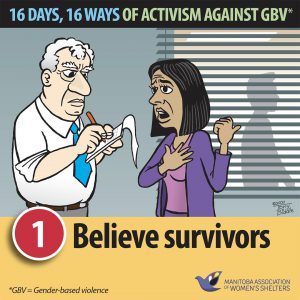
Step 1 of #16Days16WaysAgainstGBV: Believe Survivors.
It takes great courage for survivors to disclose experiences of violence or assault. GBV can happen anywhere and to anyone, and predators often use skewed power imbalances and even their influence over the system to control and abuse those in positions of less power than them. Abusers can threaten survivors with legal, physical and social repercussions for breaking their silence, and fear of these often prevents survivors from speaking out. Abuse thrives in silence and isolation. So let’s #BelieveSurvivors and support them when they #BreakTheSilence around GBV.
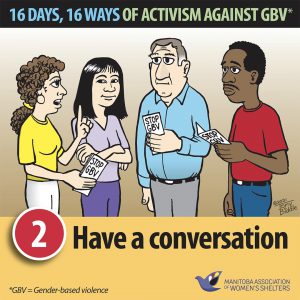
Step 2 of #16Days16WaysAgainstGBV: Have a conversation.
Abuse thrives in silence. Let’s challenge that silence by having open, honest and supportive conversations about gender-based violence: its various forms & how to support survivors.
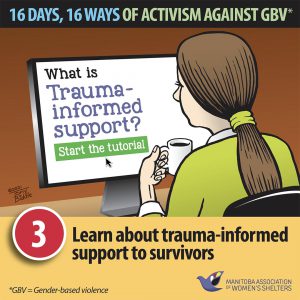
Step 3 of #16Days16WaysAgainstGBV: Learn about trauma-informed support for survivors.
Working through trauma is a long and difficult journey. A trauma-informed lens means to empathize more, judge less, and recognize how intergenerational trauma, loss, adversity, and intersectionality profoundly impact a person’s present and future. A good place to learn more about trauma-informed support for survivors is the online “Stop Family Violence” Course.
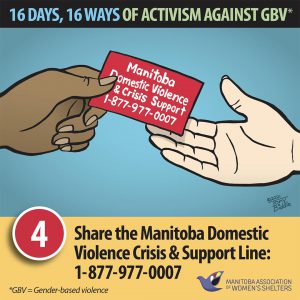
Step 4 of #16Days16WaysAgainstGBV: Share the Toll-Free Confidential Domestic Violence Crisis and Support Line Number (1-877-977-0007).
If someone is feeling unsafe, experiencing abuse, needs help with safety planning or just wants to talk, the Crisis & Support Line is a good place to get help.
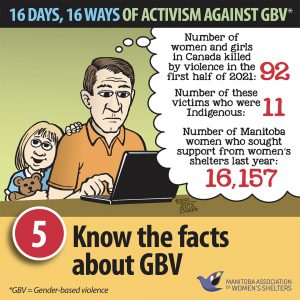
Step 5 of #16Days16WaysAgainstGBV: Know The Facts about GBV.
Abuse can happen anywhere, at any time, and can affect anyone, regardless of their background, ethnicity, age or income. However, due to systemic discrimination and barriers to justice, some groups are more vulnerable to abuse. This includes Indigenous women & girls, 2SLGBTQQIA folks, newcomer women, people with disabilities & women from rural & remote areas, to name a few. Learning the facts about GBV helps us realize that acts of abuse are not just “isolated” incidents. The facts can help us recognize that GBV is a widespread systemic, human rights & public health crises. We need to break the silence that allows abuse to thrive. We need to believe survivors and prioritize barrier-free, trauma-informed support and care to support them in their journey towards justice and healing.
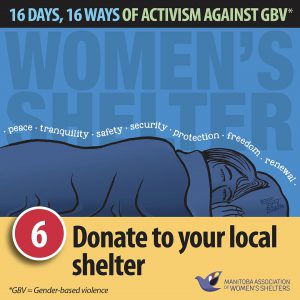
Step 6 of #16Days16WaysAgainstGBV: Donate to a local Family Violence (FV) shelter or agency.
The challenges of the pandemic have affected the physical and mental health of all frontline workers. Shelter staff across the province are experiencing increased levels of compassion fatigue & burnout. Through all this, shelters have continued to work hard to stay open, follow COVID safety protocols, offer safe spaces, community educational resources and programs for those affected by violence. But COVID has also impacted shelters’ fundraising initiatives. They need your help to keep supporting women, families, and all those fleeing violence. During the pandemic, the rates and severity of gender-based violence have increased. It’s more important than ever to keep doing the work needed to #EndGBV. This #GivingTuesday, support a Manitoba Family Violence shelter/agency and help #EndGBV in our communities. You can find a list of some FV shelters and agencies on our website.
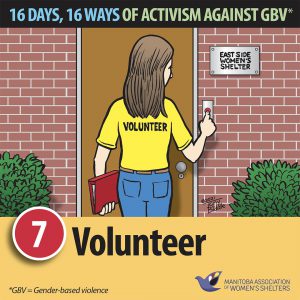
Step 7 of #16Days16WaysAgainstGBV: Volunteer.
Manitoba gender-based violence (GBV) organizations need support. During these 16 days and beyond, call your local family violence shelter/agency, GBV program or women’s resource centre to see how you can make a difference.
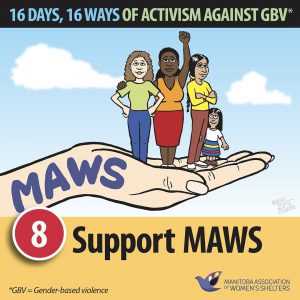
Step 8 of #16Days16WaysAgainstGBV: Support MAWS.
We’re a small charity with a very big mission: To help #EndGBV in Manitoba. Our work involves support to family violence shelters and agencies, advocacy services, and training for our members and associate members. Throughout COVID, we have worked hard to make sure Manitoba shelters have the resources they need to stay open and provide safe spaces for those seeking refuge from violence. Your support will help us to keep doing our work of providing a unified voice for those affected by violence.
Click here for more information about us and our story. Click here for more information on how to donate to MAWS. If you’re looking for volunteer opportunities in the GBV prevention sector, email us at
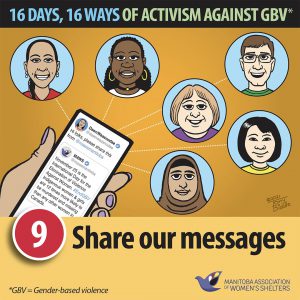
Step 9 of #16Days16WaysAgainstGBV: Share our messages.
Each of us has a responsibility to learn more, have conversations and raise awareness of gender-based violence. We’re always sharing information on GBV awareness and trauma-informed support for survivors. A violence-free world is possible. Help us spread the word about GBV and #BreakTheSilence around this urgent human rights and public health issue.
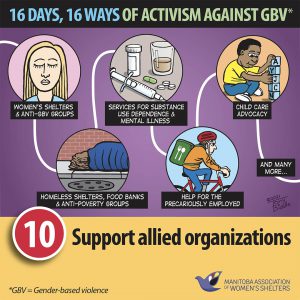
Step 10 of #16Days16WaysAgainstGBV: Support allied organizations.
Violence can intersect with many other experiences, including precarious housing, unstable employment, legal concerns, lack of child care, mental illness and substance use dependence. Organizations in these aligned sectors do invaluable and often life-saving support work, and like women’s shelters, they have also been affected by increased levels of COVID-related compassion fatigue and burnout. Let’s take the time to visit their websites and social media to learn more about their work and how we can support them.
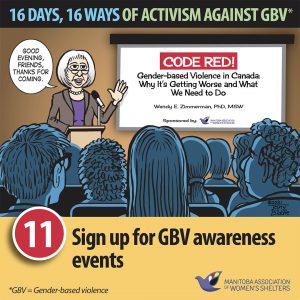
Step 11 of #16Days16WaysAgainstGBV: Sign up for GBV awareness events.
Family violence (FV) shelters and agencies, domestic violence programs and women’s resource centres have been hosting virtual awareness events, speakers and advocates doing important GBV prevention work in our communities. Learn more about GBV prevention and show your support by signing up for their events.
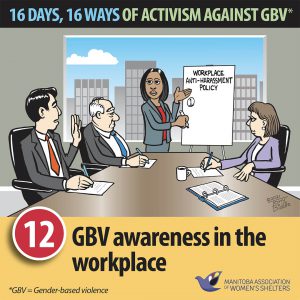
Step 12 #16Days16WaysAgainstGBV: Raise awareness of gender-based violence (GBV) in the workplace.
GBV can happen anywhere – including our workplaces. Women and many other groups facing historic and ongoing discrimination are disproportionately affected by GBV in the workplace, which can include unwelcome remarks, inappropriate jokes, sexualizing and demeaning comments, non-consensual physical contact, harassment, and sexual assault. GBV is a human rights violation, but remains underreported because survivors are often threatened with social, professional, economic and physical repercussions by abusers and those who enable them.
Everyone has the right to be safe wherever they are and everyone deserves a safe and respectful workplace. Talk to your organization’s management or employers about the need for greater workplace harassment prevention training. Email us at if you would like to know more about GBV prevention or would like to be connected with community resources.
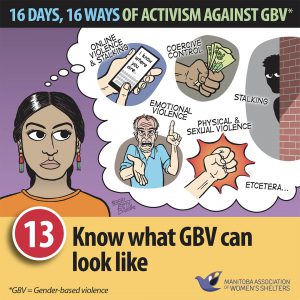
Step 13 of #16Days16WaysAgainstGBV: Know what gender-based violence can look like.
Gender-based violence (GBV) can happen anywhere and to anyone, regardless of their age, background, ethnic identity, gender identity, or income. Violence can take many forms, including:
-
- Verbal abuse, such as demeaning remarks, inappropriate jokes, and unwanted sexualizing comments;
- Emotional abuse and controlling/manipulative behaviour;
- Coercive control, including isolating the survivor from family, friends and loved ones, gaslighting the survivor, making them question their own memory &/or version of events, and belittling/lying about the survivor to their friends, family, children, and colleagues.
- Criticizing you with frequent put-downs, name-calling, demeaning you.;
- Financial/economic abuse, such as preventing access to the survivor’s banking information, controlling the survivor’s paychecks, forcing them to leave employment, or withholding child support;
- Physical threats, unwanted physical contact and violence;
- Sexual violence and assault;
- Harassment, intimidation and stalking;
- Cyber violence, such as non-consensual sharing of the survivor’s intimate images or videos; online stalking, doxxing, etc;
- Spiritual abuse, including belittling the survivor’s faith, preventing them from practising their religious beliefs, and/or abusive and controlling behaviour by a faith leader to members of a religious/faith-based group.
GBV is a human rights violation, but remains underreported because survivors are often threatened with social, professional, economic and physical repercussions by abusers and those who enable them. We need to listen to, believe and amplify survivors’ stories. We need to be active bystanders. It’s on us to name and call out abusive behaviour, and help #EndGBV. For more information on the various forms of abuse and how to support survivors, visit our website: www.maws.mb.ca
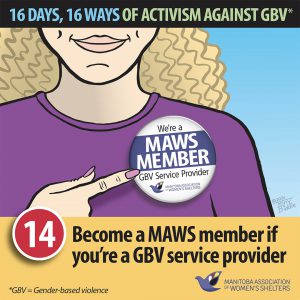
Step 14 of #16Days16WaysAgainstGBV: If you’re a GBV prevention organization, consider becoming a MAWS member/associate member.
MAWS is committed to providing a unified voice for those affected by gender-based (GBV) and family violence (FV). We’re a small charity with a very big mission: To help #EndGBV in MB. At this time, while we’re not open to membership for individuals, we welcome all Manitoba organizations working in the GBV/FV space. If your organization provides support to those affected by GBV, getting a MAWS membership means free access to training, support and advocacy services. Contact us at to learn more about membership and associate membership. Visit our website to learn more about our story, our mission and the principles that guide us in our work.
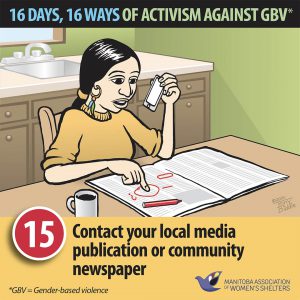
Step 15 of #16Days16WaysAgainstGBV: Contact your local media publications or newspapers and advocate for survivor- and human rights-centered language in news reports about gender-based violence (GBV).
The language used to talk about gender-based violence is critical to how communities perceive GBV and treat survivors. It’s imperative that we use human rights- and survivor-centred language that is respectful, trauma-informed and non-judgmental. The language used in news reports, media and pop culture about abuse, harassment, sexual violence frequently perpetuates myths and misrepresentations about GBV and survivors. This is wrong, and adds considerable risk and trauma to the lives of survivors. Each of us has a responsibility to call out such misogynistic and sexist language.
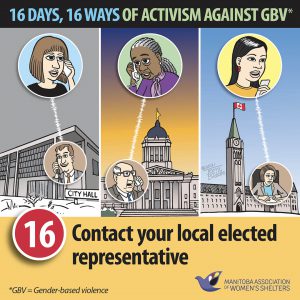
Step 16 of #16Days16WaysAgainstGBV: Contact your elected representatives and advocate for more policies and investment in GBV prevention.
On #HumanRightsDay and beyond these #16Days, we encourage you to write to your local elected representatives at all levels of government to ask about what they’re doing to end gender-based violence (GBV) in Manitoba communities. When we raise our voices together in support of safety, equality, and equity, we create safer, healthier, and more equal and just communities.
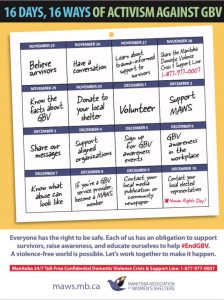
Human Rights Day on December 10, 2021, marked the end of our #16Days16WaysAgainstGBV. Thank you to all those who shared our messages and helped raise awareness of gender-based violence (GBV) and violence against women (VAW). This year’s global #16DaysActivism campaign may be over, but our work to #EndGBV continues. We encourage you to keep learning about and taking action against GBV beyond the #16Days. Abuse thrives in silence & isolation. But if we work together and #BreakTheSilence, a violence-free world is possible. Today and every day, we need to believe survivors. We need to keep the conversation about GBV prevention alive in our homes, workplaces, communities, and governments. We need to stand with survivors, listen to them and amplify their voices. We need inclusive, non-discriminatory and barrier-free systems to support those affected by violence. It’s on each of us to do the work needed to end gender-based violence.








